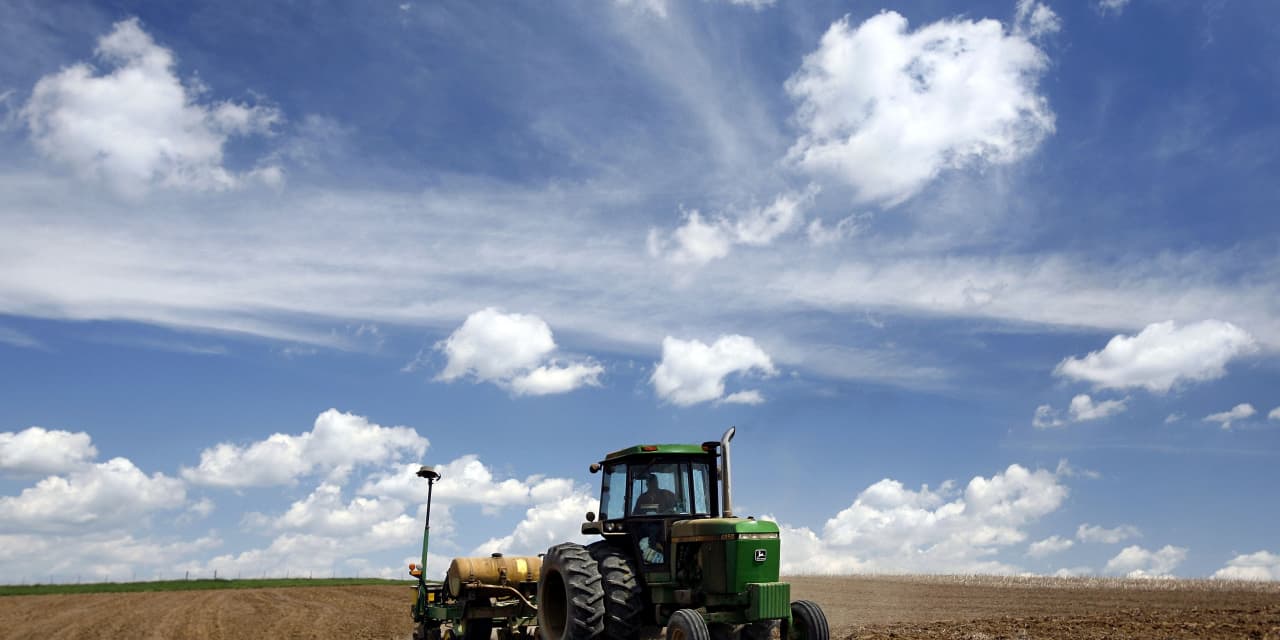Deere
stock was dropping after the company reported better-than-expected fiscal first-quarter earnings. Guidance, however, was pushing the stock lower.
Deere on Thursday announced earnings per share of $6.23 from machinery sales of $10.4 billion. Wall Street was looking for earnings per share of $5.26 from sales of $10.3 billion, according to FactSet. A year ago, Deere reported profit of $6.55 a share from sales of $11.4 billion.
It looked like a solid result. Shares, however, were down 5.7% in late trading Thursday, while the
S&P 500
and
Dow Jones Industrial Average
were up about 0.3% and 0.5%, respectively.
Guidance appeared to be making investors nervous. Deere now expects net income to come in at about $7.6 billion for the year. In November, Deere said fiscal-year net income would be about $8 billion. With first-quarter results in, Deere expects to generate earnings per share of about $21 in the final three quarters of the year. Wall Street was looking for $23 a share.
The big part of the shortfall is coming from Europe, says Edward Jones analyst Faisal Hersi. Farm incomes across the Atlantic have come under more pressure than incomes in the U.S., he adds.
“Deere’s first-quarter performance underscores the effectiveness of our Smart Industrial operating model and the dedication of our workforce, enabling improved performance across economic cycles that surpasses historical benchmarks,” said CEO John May in a news release.
The agricultural cycle is turning lower. Investors knew that. Coming into Thursday trading, corn prices have fallen about 37% over the past 12 months. That has farmers spending less and Deere sales falling year over year.
That dynamic is showing up in the results of Deere’s peers too.
CNH Industrial
on Wednesday reported fourth-quarter earnings and gave 2024 guidance that matched investors’ expectations. The company expects to earn about $1.55 a share in 2024, down from $1.70 earned in 2023.
CNH shares rose 6.2% in response, a move that signals investors expected something much worse.
“Back in 2012, 13, and 14, there was massive [amounts of] leases coming back, used inventory was really high, pricing was really low…it was just a bad setup,” said CNH CEO Scott Wine. ”You’ve got a starting point [today] that’s way better than previous cycles.”
Wine said inventories, pricing, and average equipment age—which is high—all were favorable for his company. That’s partly a legacy of constrained production amid Covid-19 supply chain challenges. What’s more, farmers are adopting higher-margin precision technology such as smart planters and self-driving tractors.
AGCO,
another peer, reported fourth-quarter earnings earlier in February. Its results looked similar to CNH’s. Guidance was in line with Wall Street’s expectations, while sales and earnings are expected to fall in 2024 compared with 2023. Shares rose 1% in reaction.
CNH and AGCO stocks rose partly because investors have been gloomy when it comes to agricultural machinery stocks. Coming into Thursday trading, shares of Deere, CNH, and AGCO were down about 6%, 24%, and 17% over the past 12 months, respectively. The S&P 500 was up about 21% over the same span.
Deere’s decline has left shares trading for 13.2 times estimated calendar year 2024 earnings. AGCO and CNH shares trade for 8.7 times and 8.2 times, respectively.
Hersi rates Deere shares Buy but doesn’t have a price target for the stock. A buy rating means he expects shares to outperform the market. Overall, 56% of analysts covering the company rate shares Buy. The average Buy-rating ratio for stocks in the S&P 500 is about 55%. The average analyst price target for Deere shares is about $429.
Write to Al Root at [email protected]
Read the full article here




